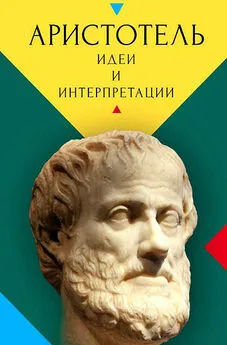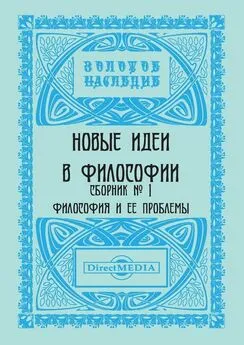Коллектив авторов - Аристотель. Идеи и интерпретации
- Название:Аристотель. Идеи и интерпретации
- Автор:
- Жанр:
- Издательство:Аквилон
- Год:2017
- Город:Москва
- ISBN:978-5-906578-31-0
- Рейтинг:
- Избранное:Добавить в избранное
-
Отзывы:
-
Ваша оценка:
Коллектив авторов - Аристотель. Идеи и интерпретации краткое содержание
Издание подготовлено при поддержке Российского научного фонда (РНФ), в рамках Проекта (№ 15-18-30005) «Наследие Аристотеля как конституирующий элемент европейской рациональности в исторической перспективе».
Рецензенты:
Член-корреспондент РАН, доктор исторических наук Репина Л.П.
Доктор философских наук Мамчур Е.А.
Под общей редакцией М.С. Петровой.
Аристотель. Идеи и интерпретации - читать онлайн бесплатно полную версию (весь текст целиком)
Интервал:
Закладка:
595
Пер. Н.Т. Голинкевича. Ср. перевод Чарльза Гулика: «Aristotle says in the work On Drunkenness : „If wine be boiled down moderately, the drinking of it is less apt to cause intoxication; for the potency of it when boiled down becomes weaker. Older men, he continues, become intoxicated soonest because of the slightness and weakness of the natural heat contained within them. But very young persons also become intoxicated rather quickly because of the large amount of heat within them; for they are easily overpowered by the heat which is added from the wine…“». — См.: Gulick (tr.) 1957, p. 445. Ср. также перевод Йонга: «And Aristotle, in his treatise On Drinking , says, „If the wine be moderately boiled, then when it is drunk, it is less apt to intoxicate; for, as some of its power has been boiled away, it has become weaker“. And he also says, „Old men, become drunk more quickly on account of the small quantity of natural warmth which there is in them, and also of the weakness of what there is. And again, those who are very young get drunk very quickly, on account of the great quantity of natural warmth that there is in them; for, in consequence, they are easily subdued by the warmth proceeding from the wine which is added to their natural warmth…“». — См.: Yonge (tr.) 1854, vol. II, p. 677–678.
596
Пер. В.Т. Звиревича. Ср. перевод П. Дэйвиса: «I remember having read in the work of a Greek philosopher (onless I am mistaken, it was Aristotle’s treatise On Drunkenness ) that women rarely become drunk but old men often, and that no explanation was given either of the frequency of the one occurrence or of the rarity of the other. Non since this question is one that is wholly concerned with our bodily nature… (16) In this as in everything else… Aristotle is right… Women, he says, rarely become drunk, old men often. There is a completely rational explanation of each part of this twofold statement, and the one depends on the other; for when we have learned what it is that keeps women from becoming drunk, then we know what it is that often brings old men to this pass, since it so happens that the nature of a woman’s body is the direct opposite of the nature of an old man’s body». — См.: Davies (tr.) 1969, p. 470.
597
Такое значение для чтения «senes» предложено В.Т. Звиревичем. См. Звиревич (пер.) 2013, p. 484.
598
Пер. В.Т. Звиревича.
599
Пер. В.Т. Звиревича. Ср. английский перевод П. Дэйвиса: «(17) A woman’s body is full of moisture, as appears from the smoothness and sheen of her skin, and above all from the repeated purgings which rid her body of the burden of superfluous fluid. The wine, then, that a woman drinks meets such an abundance of fluid that it loses its force and becomes diluted, and with its strength extinguished it does not easily attack the seat of the brain. (18) The truth of this statement is supported by the further consideration that a woman’s body, being subject to frequent purgings, is provided with a number of outlets to open up channels and make ways for the exit of the moisture that collects for evacuation, and it is through these outlets that the fumes of the wine quickly disappear. (19) An old man’s body, on the other hand, is dry, as is evident from the harshness and roughness of his skin, That is why at that time of life it becomes more difficult to bend, for this too is an indication of dryness. Wine drunk by and old man encounters no resistance and opposition from moisture but lays hold of the dry body with its strength unabated and presently takes possession of the parts which serve a man’s faculty of reason. (20) The bodies of old men are, without doubt, hard as well; and so, in these harder limbs, the natural channels themselves also become blocked, and consequently there are no means of escape for the fumes of the wine drunk, but they ascend in their entirety to the very seat of the mind». — См. Davies (tr.) 1963, p. 470–471.
600
Пер. В.Т. Звиревича. Ср. английский перевод П. Дэйвиса: «(21) Thus it happens that, even when they are sober, old men labor under the unpleasantnesses which attend drunkenness — for their limbs tremble, their speech is indistinct, they are talkative, and they are easily provoked to anger — and in their liability to these conditions old men sober resemble young men drunk. If, then, old men are but slightly under the influence of wine, they do not experience these unpleasant symptoms for the first time but rather exhibit in a more marked degree symptoms to which they have already become subject by reason of their age». — См.: Davies (tr.) 1963, p. 471.
601
См.: Петрова (2015В), с. 60–62.
602
См.: Петрова (2015Б), с. 72–81.
603
Исследование выполнено при финансовой поддержке РНФ, в рамках проекта (№ 15-18-30005) «Наследие Аристотеля как конституирующий элемент европейской рациональности в исторической перспективе». Впервые опубликовано: ΣΧΟΛΗ (Schole) 10/2 (2016). c. 366–376.
604
Заметим, что в раннее Средневековье преимущественно была распространена литература о видениях, а не о снах. См., напр.: Amat, J. 1985; Dulaey, M. 1973.
605
См., напр., у Алкуина ( Comm. in Ap. PL 100, 1089AB) и Седулия Скотта ( Collect. mise. diuisio 40, 1). Подробнее см.: Петрова, М.С. 2007. 155-9.
606
Следует обратить внимание на примеры, взятые Григорием из Писания для обозначения четырёх видов сна (которые будут заимствованы многими средневековыми авторами (e.g.: Гонорий Августодунский [Eluc. III, 9: Undesomnia , PL 172, col. 1163A]). Указывая на иллюзорность сновидений, Григорий цитирует строки из Ветхого Завета (Сир. 34: 7; Лев. 19: 26). Для снов двойного происхождения, он приводит строфу из Екк. 5: 2 ( размышление и иллюзии ), а также упоминает историю Даниила, растолковавшего сон Навуходоносора (Дан. 2: 29–31) ( размышление и откровение ). Для обозначения снов, посланных Богом, происходящих от тайных откровений , Григорий указывает на сны ветхозаветного Иосифа (Быт. 37: 6–7 и 9) и Иосифа, супруга Марии, из Нового Завета (Мф. 2: 13). См. Greg., Dial (ad loc.). Также см.: Морозова, Е.В., пер. 2001, 355-7; 366-8.
607
См. Петрова, М.С. 2007. 135-54; 155-72.
608
Об известности ряда трактатов Аристотеля из Parva Naturalia в арабском мире, среди которых: De sensu, De memoria, De somno, De insomniis, De divinatione, De longitudine , см.: Donati, S. 2012, 346. Об арабских переводах Parva Naturalia , а также о гипотезисе существования различных версий этого собрания Аристотелевых текстов, их восприятии в арабском мире, см.: Di Martino, c. 2003, 375-8. О платонизированном Аристотеле см.: Hansberger, R. 2006 / 7; Eadem 2008, 50–77; Eadem 2010, 143-62; Eadem 2011, 57–84; Endress, G., 2012, 274-5. О малых естественнонаучных сочинениях Аристотеля О сне и бодрствовании, О сновидениях, О предсказаниях во сне см.: Чулков, О.А. 2005, 420-32; Чулков, О.А., пер. 2005, 423-32; Солопова, М.А. 2011,40–58.
609
О знании Галеном теорий Аристотеля см.: Балалыкин, Д.А. 2015А. 119-34; Балалыкин, Д.А. 2015Б, 95-112; Балалыкин, Д.А. 2015В, 124-43.
610
О чтении Гильомом Макробиева Комментария на «Сон Сципиона» , см.: Jeauneau, Е. 1960, 17–23; Idem 1971, 95-102; Dronke, P. 1974, 13–78.
611
См. также: Dephil. mundi I, 21 (50AB); I, 23 (58A); II, 11 (6 °C); II, 32 (74A); IV, 15 (90B).
612
Комментарий Гильома на текст Макробия еще не издан. Здесь мы следуем A.M. Peden (см.: Peden, A.M. 1985, 64), использовавшей манускрипты: MS. GL. Kgl. S. 1910, 4 o, ff. 11 v-14 r(Copenhagen Rjngelige Bibliothek). Также см.: Gul., Glos. sup. Plat. CXL–CXLI (Jeauneau, Е. ed. 1965. 241-3).
613
Латинское слово «fumus» (пар, туман) соответствует греческому ἀτμίς, ίδος (=ἀτμός). Ср. Arist., Met. I, 3 (340а 34–35, 340b 3, 340b 28); Ibidem I, 9 (346b 29 и 32); Ibidem I, 10 (347a 17, 19 и 24); Ibidem I, 11 (347b 24); Ibidem II, 4 (359b 30, 360a 23, 360b 35); Ibidem III, 3 (372b 32); Ibidem IV, 7 (384a 6); Ibidem IV, 9 (387a 25). Также см.: Idem, De gener. animal . 784b 15, 17–18 и 22; Idem, De gener. et corr. 330b 4; Idem, Probl. 906b 21, 907a 29, 924a 38, 927b 11, 935b 33, 937a 7, 939b 22, 941a 39, 947a 23; Idem, De sensu 443a 26 и 30.
614
Ср. трактат Аристотеля О сновидениях (особ. гл. 3), в котором идёт речь о «механике» и психофизиологии сновидений. См. также: Чулков, О.А. 2005, 421-2.
615
См. Dephilos. mundi IV, cap. XXI–XXII, PL 172, col. 94AC: [cap. XXI. De somno ]: Somnus ergo est quies animalium virtutum cum intensione naturalium. Contingit autem, fumo humido ad superiora ascendente, implentur nervi quibus animalis virtus solet descendere. Desinit ergo videre animal, et audire, etc., donec naturali calore illo desiccato, animalis spiritus incipiat ascendere, et ad aliquem sensum animalem excitare; [cap. XXII. Unde somnia, et de animali et spiritali virtute ]: Somnium vero ex reliquiis cogitationum, ex cibo et potu, et ex temperie, et ex complexione, ex qualitate jacendi, habet existere, et hoc nihil significat. Alia ex ministratione angelorum, alia ex mundi causa, alia ex virtute et libertate animae, quorum omnium probationes in promptu habemus. Sed quoniam nostro proposito hoc multum non attinet, et ad finem voluminis tendimus, illo praetermisso ad spiritualem virtutem transeamus. Praedictus ergo fumus per diversa foramina transeundo subtiliatus ad cor perveniens, ad attrahendum aera illud dilatat, ut interior calor temperetur: ad expellendas vero superfluitates idem constringit, et tunc dicitur spiritalis virtus, cui arteriae deserviunt. Sed ad animalem virtutem veniamus. Praedictus vero fumus per nervos ascendens colando, ita subtilis efficitur: qui, perveniens ad cerebrum, spiritus dicitur; descendensque per diversa instrumenta, diversas operatur animales virtutes, ut ostendemus: quae quia e cerebro prodeunt, de ipso ante dicamus, deinde qualiter sensus inde prodeant, et quoniam in capite continentur, ab illo exordiamur. Ср. Аристотель, О сновидениях 461а, 462ab (Чулков, О.А., пер. 2005, 428-32).
Читать дальшеИнтервал:
Закладка:










